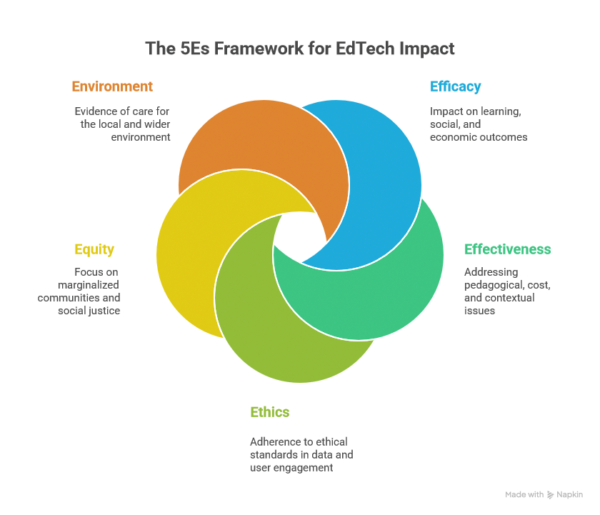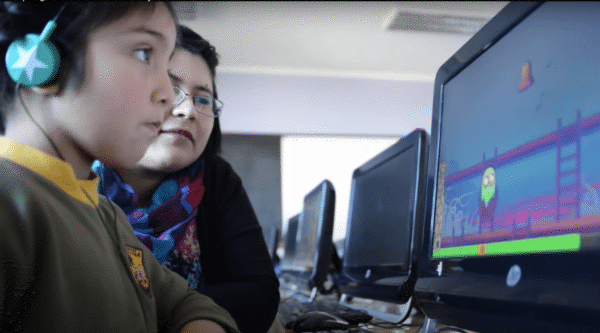The EdTech Index helps school districts and procurement teams identify solutions that are not only innovative but also proven to deliver meaningful impact.
Through a recent partnership with EduEvidence (also known as the International Certification of Evidence of Impact in Education, ICEIE), the EdTech Index can now recommend products from a global database of research-verified solutions. This collaboration enables US school districts and EdTech companies to join an international catalogue, expanding access to trusted educational technologies worldwide.
EduEvidence collates EdTech products according to five categories of impact, the so-called “5Es”.
The 5Es of EdTech Impact
EduEvidence structures its certification process around the widely recognized 5Es framework of educational impact. Developed by an international research consortium, this framework is supported by a range of reports and scholarly articles, including a recent publication in Nature. The framework categorizes educational impact into five distinct evidence areas: Efficacy, Effectiveness, Ethics, Equity, and Environment.

In the case of EdTech and certifications, the 5Es apply as follows:
● Efficacy – Validates that a product’s impact has been demonstrated through controlled research studies, such as Randomized Controlled Trials (RCTs), aligned with recognized standards like the USA’s ESSA tiers or Australia’s AERO standards.
● Effectiveness – Prioritizes real-world teacher and student experiences, considering contextual fit, scalability, and cost-effectiveness in authentic classroom environments.
● Ethics – Evaluates how responsibly companies manage data privacy, security, interoperability, and AI governance.
● Equity – Measures a product’s commitment to inclusive and fair design, ensuring underserved and marginalized communities are supported.
● Environment – Assesses a solution’s alignment with sustainable practices and its contribution to environmental education and awareness.
EduEvidence uses the 5Es framework to certify solutions and currently features over 1,700 validated or certified products in its catalogue. This catalogue is widely used by policymakers around the world to identify relevant tools and also supplies data to other platforms, including the EdTech Index. As a result, companies certified by EduEvidence are automatically included in these additional catalogues. For many companies, earning the EduEvidence certification is highly valuable.
As one recently certified company, GraphoGame, explains, this certification provides meaningful official recognition that strengthens international expansion by enhancing credibility with policymakers and procurement teams.
Jesper Ryynänen, co-founder of GraphoGame, said, “Even though we have large amounts of peer-reviewed research on GraphoGame, certification aided in collating our broad research into a succinct and intuitive certificate proving the efficacy of our app to decision-makers to universities, schools and ministries of education. Working with EduEvidence has helped us get more warm leads and faster trust-building with potential customers.”

You can learn more about what companies get out of the EduEvidence badges by watching a webinar recording that featured two companies that earned the EduEvidence and ISTE badges.
Why EduEvidence Badges Matter for International Decision-Makers
EduEvidence badges provide a shared, internationally recognized framework, making it easier to compare products on equal terms. For example, if a company holds an ESSA badge and wants to expand to markets like Hong Kong, EduEvidence’s equivalence scheme recertifies the ESSA level and associated research against a consolidated benchmark developed by the research consortium.
This equivalence scheme eliminates the need for companies to repeatedly explain their research studies, allowing policymakers and procurement teams to trust the badge with ease and clarity. It offers immediate insight into the type of evidence supporting the product, assurance that the certification meets rigorous, recognized criteria, and a faster, more confident path from shortlist to selection.
This is especially valuable in international procurement contexts, where teams may be unfamiliar with local certification schemes or where evidence quality varies widely.
Building a Culture of Evidence-Based EdTech Selection
While innovation is vital, it is evidence that should ultimately guide EdTech adoption. EduEvidence badges signify a cultural shift toward internationally coherent standards of EdTech quality. In a crowded market, this clarity can be the difference between investing in a product that truly delivers impact and one that only promises to do so.
Although many frameworks and evidence labels exist, the ecosystem needs shared standards to define what counts as quality. By collaborating with leading research consortia, EduEvidence has established such standards, and it’s encouraging to see integrations with important catalogues like the EdTech Index, helping to bring trusted data to a global audience.



